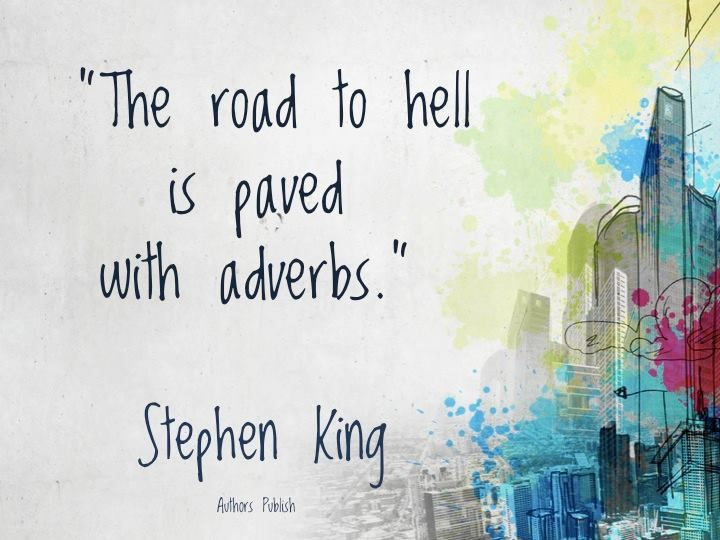Ah, the adverb. The bane of editors everywhere, but I think they have their place. I love this quote about adverbs:
“Overuse at best is needless clutter; at worst, it creates the impression that the characters are overacting, emoting like silent film stars. Still, an adverb can be exactly what a sentence needs. They can add important intonation to dialogue, or subtly convey information.” ― Howard Mittelmark, How Not to Write a Novel: 200 Classic Mistakes and How to Avoid Them–A Misstep-by-Misstep Guide
 I much prefer that one to Stephen King’s famous quote in the image to the left, which seems to me to be a bit harsh. Yes, adverbs can be overused–read any work from a new writer and you will see why–but in moderation, adverbs are an essential component in writing fiction.
I much prefer that one to Stephen King’s famous quote in the image to the left, which seems to me to be a bit harsh. Yes, adverbs can be overused–read any work from a new writer and you will see why–but in moderation, adverbs are an essential component in writing fiction.
So, to assist you in finding that fine line between just enough and too many, here are the rules for adverbs:
Adverbs are words that describe verbs, adjectives, and other adverbs. They specify manner, when, where, and how much.
He spoke loudly to be heard over the din.
She read the letter quickly.
It was raining yesterday.
The dog ran far.
I always eat fish for dinner. (Okay, not really.)
I have never been to Argentina.
Not all adverbs end in -ly, and you can’t always make an adverb from an adjective simply by adding -ly.
Far, fast, ever, and after are all adverbs.
I came across hyperly yesterday in something I was editing. Nope, not a word.
Naturally, there are exceptions, because this is English. (If you ask me, the road to hell is paved with exceptions to English grammar rules.)
An adjective always follows a form of the verb to be when it modifies the noun before the verb.
I was nauseous.
His efforts to be helpful were fraught with peril.
Verbs of sense and appearance are followed by adjectives when they modify the noun before the verb.
I felt awful.
This wine tastes terrible!
What about good vs well?
It is common to reply to the question “How are you?” with “I’m good.” Others respond with “I’m well.” (I once had a client from Russia who always responded with “Thank you, I am nice.” It was such a lovely phrase, and he was indeed such a nice man, I was very sad when he learned it was technically incorrect and switched to “I am fine.”)
Anyway. Which of these is correct? Both, actually, although well should only be used when you are referring your state of health. Check out this post by The Grammar Girl, or this one from GrammarBook for the reasons why.
Bad vs. badly?
Do you feel bad or badly? Bad is actually correct, because as noted above, you should use an adjective when it follows a verb of sense or appearance. Using badly would imply you are not very accomplished at feeling, which might be true but probably isn’t what you meant. Check out this humorous post from The Grammar Girl (again) for a better explanation, and note especially her comment that an easy way to determine which one to use is to substitute the word am for feel (or, presumably, for another sense/appearance verb). If it sounds funny using am, use the other one. For example:
I feel badly.
I am badly. Um, no.
I look bad.
I am bad. Okay.
Adverbs in dialogue tags
These show up entirely too often in the work of new writers. Adverbs in dialogue tags can be a sign of telling rather than showing. For example, you can write, “OMG!” she said loudly. Loudness, however, is implied by the exclamation point, so you don’t necessarily need a dialogue tag at all, but if you really, really want one, “OMG!” she yelled would be stronger, as it would show rather than tell.
This is not to say you can never use adverbs in dialogue tags. For example, “Thank you,” she said softly is perfectly acceptable (although “Thank you,” she whispered would be better–show, don’t tell).
I do have strong feelings on dialogue tags–a 12 hour car ride to Missouri listening to Magic Tree House books on tape will change your opinion on them, trust me–but that’s a subject for another post.
For more about adverbs, check out these links:
http://www.quickanddirtytips.com/education/grammar/how-to-eliminate-adverbs
http://writinginwonderland.blogspot.com/2011/04/annoying-adverbs.html
http://www.english-grammar-revolution.com/list-of-adverbs.html
https://owl.english.purdue.edu/owl/resource/537/02/
http://writedivas.com/quick-tips-adverbial-dialogue-tags/
http://blog.karenwoodward.org/2014/08/using-adverbs-in-dialogue-tags-matter-style-or-sign-of-timidity.html
What do you think? Adverbs–friend or foe?
